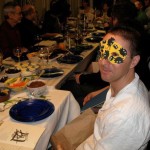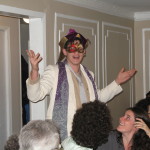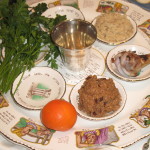In his speech today to students in Israel, President Obama told the crowd that he started holding seders at the White House because he wanted his children to know the story and the message of the haggadah.
The things we do for our children. My original motivation to create a special Passover experience came from being a parent. Or at least that’s what I told myself at the time. I wanted my children to have something unique, meaningful, and wonderful to remember. I wanted them to learn the meta-messages of Passover, and to experience the joy of this holiday of hope and renewal.
This wish led the development of many new traditions and the reclaiming of some old ones as well. Over the years, as my children have transformed from babies to young adults, our family tradition, and their roles in it, has continued to evolve.
What is tradition one year becomes history the next year, and what is new and experimental can quickly become standard, until it’s not anymore. There’s a dynamism to the tradition that enables us all to keep growing. The plays they used to put on during the maggid section of the seder, generally focusing on Moses, Pharaoh, and the plagues, gave way to paperbag dramatics as they emerged into adolescence, which then morphed into a Passover theme charades game, and now has likely receded into fond memories entirely.
One of the traditions my husband brought from his family’s seders centered around the arrival Elijah. When it was time to open the door and welcome Elijah, suddenly who should be standing on the doorstep but Elijah himself, also known as Uncle David. This custom had a long history in their family, going back at least one generation further to my husband’s grandfather. My husband became our family’s Elijah, mysteriously disappearing from the table and arriving on at the front door in full costume, much to the delight of the young children. And now, it has become my son’s job, a role he takes very seriously.
My daughter has taken on the role of commentator on the Four Children, a part of the seder that she finds troubling. For the last several years, she has led us in discussing the problematic nature of this element of the seder. The orange on the seder plate is also her contribution, and she carefully explains its role to any newcomers around the table who might not be familiar with this new addition.
I am proud that they have found ways to make parts of the seder their own, and to contribute to our ongoing evolution of tradition. Every year draws on past years, and is a little bit different too as we all continue to learn more and grow. Last night my son came home from post-confirmation class at the rabbi’s house and announced that he had some good material to talk about at the seder. I can’t wait to hear what it is.
At this stage of parenting though, I have to look back and admit that much of what was done in the name of my children was really as much for me as it was for them. When they were young, there was plenty I did with them not only because they would like it, but also because it gave me an excuse to do it. Spend the afternoon in the park on a sunny afternoon? Let’s do it! Play with playdough? Sounds fun! Put together a Lego Hogwarts? Um, yes! So too with the development of our seder rituals. It was for them, yes, but thinking about my children’s needs and development gave me permission and courage to imagine what kind of seder I wanted for myself. Parenting provided a framework within which to think about what Passover could and should mean, and then actually make it happen.
Which brings me back to President Obama. It’s great that you want your children to get the message of the haggadah, Barack, but it’s ok if you enjoy it too.




Hara,
I respect the fact that you take the opportunity to reflect on the meaning of the seder. The children have certainly grown up into a household where people think about things – and this is something that has always caused me much joy. The granchildren are amazing because of this and other great stuff you did with them as parents. We will be there with you when in spirit this Seder – and all the seders to come.
Dont give up on the masks just yet! <3